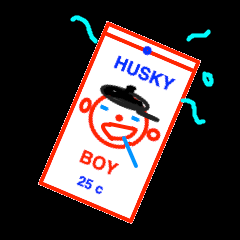The door closed behind them, the place was full of people shouting and laughing at a long bar to the right and at half a dozen booths opposite, the air was thick with smoke and pulsing with loud jukebox music, and a fat bald man in an old-fashioned three-piece tweed suit came up with a cigar in his hand.
“My dear Walt, not another one of your cabin boy friends?”
“My dear Henry,” said Walt, “my young friend only looks like a cabin boy, but he is in fact a poet.”
The fat man looked at Milford.
“Indeed?” he said.
“Indeed he is, and a damn fine one he is,” said Walt, even though he hadn’t read a word of Milford’s poetry, which was perhaps just as well, thought Milford.
“Mitford,” said Walt, “meet my good friend Henry.”
“Pleased to meet you, Medford,” said Henry, but without offering his hand.
“My name isn’t Medford,” said Milford.
“It’s Midford,” said Walt.
“No, it’s not Mitford, or Midford either,” said Milford. “It’s Milford. Milford. My name is Milford, okay?” He turned to the big poet. ”I’m sorry, Mr. Whitman, but my name is Milford.”
“Say it again,” said Walt.
“Milford.”
“Milbert?”
“Oh, my God,” said Milford.
“So your name is, what, Mildred?” said or shouted the fat man over the music and the babble. “That’s an odd name for a fellow. But then in England where I lived for many years – perhaps you can tell by my supposedly trans-Atlantic accent – one finds a multitude of chaps with names like Evelyn and Aubrey, so, hey, why not Mildred? An old family name I suppose?”
“Oh, Christ,” said Milford.
“Let me get you boys a libation,” said Henry.
“Don’t mind if I do,” said Walt. “I was just telling Wilbert about the spiced hot grog here.”
“Fuck that shit,” said Henry. “That’s for the tourist trade. How about a nice single malt Speyside aged twenty years in a fifty-year-old Amontillado cask?”
“I think Milberg really wanted to try the grog though,” said Walt.
“What?” said Milford.
“Oh, I get it, because it’s so cold and snowy out,” said Henry, and he brushed some snow off of the shoulder of Milford’s pea coat. “Righto, sure, a little grog to warm you fellows up, and then maybe the Speyside. Come on over to the bar.”
He grabbed Milford’s arm and pulled him over to the end of the bar.
“So did your ship just come in?”
“What ship?” said Milford.
“The ship you’re a cabin boy on.”
“I’m not a cabin boy.”
They were standing at the end of the bar where the counter curved into the wall.
“Jack!” yelled Henry to the bartender. “Two grogs and another Speyside pour moi!”
Henry stood to Milford’s left, and Walt to his right. They had him boxed in, but he wondered if he should just try to make a run for it anyway.
“I thought about setting off to sea when I was a young fellow,” said Henry. “But that’s all I did, think about it. You see, at bottom, I am a man who enjoys my creature comforts. How do you like it, sailing the high seas, doing a man’s job, or at least a boy’s job. Do you intend to continue with the maritime life? Perhaps someday to be master of your own ship?”
“I don’t know what you’re talking about,” said Milford. “I don’t even like the ocean.”
“If you don’t like the ocean why are you a cabin boy?”
“Henry!” shouted Walt.
“What?” said Henry.
“I just told you that Redburn is not a cabin boy, he’s a poet.”
“Oh, my mistake,” said Henry. “Ah, the libations! Thank you, Jack. Lift up that cup, my lad.”
“What’s in it?” said Milford.
A cup or mug made out of metal was on the bar in front of Milford, and the brown liquid in it gave off tendrils of steam.
“Our own recipe,” said the fat man. “It’ll warm you right up.”
“Go ahead, Bedford,” said Walt. “Raise your cup, lad, smell it, appreciate the nose.”
Milford lifted the cup with both hands and smelled. It did smell good, and the cup warmed his cold hands. He had forgotten to wear gloves this snowy night which seemed to have begun six or eight months ago.
“Take a sip, Merbert,” said Walt.
Milford took a sip. The liquid was hot, fragrant, sweet.
“What do you think?” said Henry.
“It’s not bad,” said Milford.
“Not bad, he says,” said Henry.
“Thank you,” said Milford, remembering how he was raised.
“Take another sip,” said Henry.
Milford took another sip.
“Can you pick up the star anise?” said Henry. “To me that’s the special ingredient. Along with the clove and cinnamon, of course, and the blackstrap molasses, the molasses is essential.”
“And the rum, ha ha,” said Walt.
“Yes, the rum,” said Henry, “but, you see, Pilford, this is not that Mr. Boston swill, oh no, it’s good dark rich and fragrant Jamaican rum, which I get special from a purveyor to the Royal Navy. Great twenty-gallon oaken kegs of the stuff.”
“Did you say rum?” said Milford.
“Yes, but splendid Jamaican rum, Royal Navy issue.”
“It’s good rum,” said Walt. “Them Limeys know their rum.”
Milford sighed, realizing that even though he had sighed more than twelve thousand times this day that this was the first time he had sighed in this particular place.
“What’s the matter?” said Henry. “You don’t like it? I can get you a Speyside if you’d prefer. Walt will finish your grog. Won’t you, Walt?”
“Sure I will,” said Walt. “But try another sip first, Mumphrey, it might have to grow on you.”
“Okay, please try to listen, Mr. Whitman,” said Milford. “I told you before, I am an alcoholic. I don’t drink.”
“You did? You don’t?”
“What did he say?” said Henry.
“He said he doesn’t drink,” said Walt.
“He just did drink,” said Henry. “Look, Mifford, try just one more sip, and if you really don’t like it you can try the Speyside.”
Milford suddenly felt as if his brain was expanding, like a balloon made of dreams, and the balloon was filling up this entire barroom and everything and everyone in it. So this was how it ended. A terminal bout of insanity with a couple of old fools in some crowded basement taproom. And as if it had a mad mind of its own, his hand lifted the cup to his lips, it poured the steaming liquid into his mouth and he swallowed, gulping, the hot spiced rum coursing down his throat and into his stomach.
Milford lowered the emptied cup to the bar top, and his brain subsided, sucking itself back inside his skull under his newsboy’s cap, and he exhaled a great hot breath into the smoky air.
“There’s a good fellow!” said Henry.
“Told you he was a poet, Henry,” said Walt.
“I should love to read your verse, sir,” said Henry.
Milford looked at the man, at his fat rubicund face, his bloodshot glazed blue eyes. He had his chubby hand on Milford’s left arm, and Milford realized that Walt’s great hand was on his right shoulder. He probably couldn’t escape even if he wanted to. And did he want to? Yes, but where to? Only to some other place he would want to escape from.
And suddenly Milford realized that his sentience was somehow returning, despite the mushrooms, the marijuana, the hashish, and now the grog – that his thusness was now at the forefront of his consciousness.
Gazing past the faces at the bar he saw the twinkling lights of the jukebox at the far wall, and next to it the sturdy impassive robot of a cigarette machine.
“Excuse me,” he said.
“Where are you going?” said Henry.
“I’m just going to get some cigarettes.”
“Come right back,” said Walt.
“Sure,” said Milford.
And he pulled his arm away from Henry’s hand, ducked his shoulder from under Walt’s hand and stepped away, turning hard around the end of the bar like a ship rounding the Horn.
“Nice kid,” said Henry.
“I like him,” said Walt. “Funny kid, but I like him.”
Milford floated through the smoky air, past the shouting and laughing people, mostly men but some women. Some of the faces looked familiar, but didn’t all human faces look familiar?
Up ahead was the cigarette machine, with its alluring modernistic electric lighting of gold and scarlet and silver, filled with a dozen or more brands of factory-sealed paper-and-tinfoil-and-cellophane packets filled each in their turn with a score of trimly packed tubes of potential ecstasy.
“My Ithaca,” he thought. “If I can buy a pack of cigarettes I will be happy.”
He was wrong of course, and he knew he was wrong, but he didn’t care.




















































